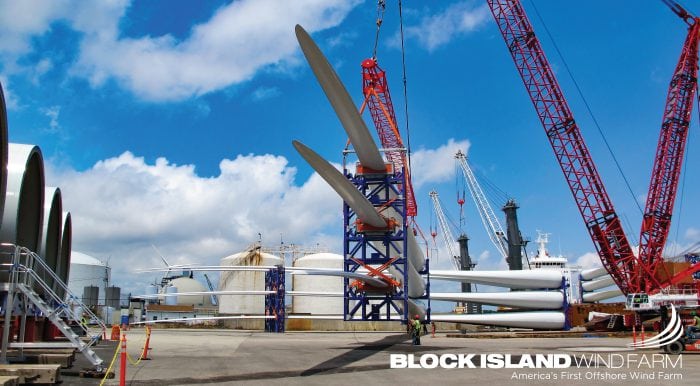Massachusetts Lawmakers Approve Energy Storage, Offshore Wind Mandates
Massachusetts' lawmakers approved an omnibus energy bill that sets down an energy storage mandate and requires utilities to solicit contracts for 1.6 GW of offshore wind.
The bill also outlines clean energy procurement targets, including for 1.2 GW from hydro, onshore wind, and other renewables from within the state, from neighboring states, or from Canada.
The House and Senate approved the bill (H. 4568) just minutes before the legislative session wrapped up for the year on July 31. Though Gov. Charlie Baker (R) is widely expected to sign the bill, his office declined to give his opinion on the measure. Unless the governor vetoes the bill within 10 days of passage, it will be enacted.
Third U.S. State to Establish an Energy Storage Mandate
The bill calls on the state's Department of Energy Resources (DER) to determine by the end of this year whether or not it is appropriate to set targets for power companies to procure, by January 1, 2020, "viable and cost-effective energy storage systems." If it chooses to set targets, it will adopt the procurement targets by July 1, 2017, and reevaluate them every three years.
As part of its decision, the DER may consider policies to encourage the "cost-effective" deployment of energy storage systems, including alternative compliance payments to help develop pilot programs. It also allows the DER to use funds earmarked for energy efficiency, if the storage system installed at a customer's premises provides "sustainable" peak load reductions on either electric or gas distribution systems.
Significantly, the bill also introduces new ownership models for energy storage technology, allowing electric distribution companies to own energy storage. "This provision opens up the opportunity for distribution utilities to own energy storage systems (classified as 'generation' traditionally, which prevented ownership)," explained the Energy Storage Association, which lauded the measure in a statement on August 1.
If the DER deems it appropriate to set targets for energy storage, it will be the third state in the U.S. to do so. California currently has an energy storage mandate that requires utilities to get 1.3 GW of energy storage by 2020. Oregon also requires its utilities-Portland General Electric and PacifiCorp-to submit proposals by January 1, 2017, to procure systems of 5 MWh or higher. Puerto Rico, a U.S. territory, meanwhile requires new grid-connected solar and wind power projects to add 30% of the installation's rated capacity in storage to aid frequency control.
Bill Mandates 1.6 GW of Offshore Wind by 2027
In an effort to boost the growth of its fledgling offshore wind industry, the bill also requires every distribution company in Massachusetts to "jointly and competitively" solicit proposals for at least 400 MW of offshore wind capacity. The companies must then enter into "cost-effective long-term contracts" with wind farm developers for an aggregate 1.6 GW of nameplate offshore wind capacity by 2027.
The solicitation and contracting process will occur under rules that must still be promulgated by the Department of Public Utilities. However, the bill requires that implementing regulations "provide for an annual remuneration for the contracting distribution company up to 2.75 per cent of the annual payments under the contract to compensate the company for accepting the financial obligation of the long-term contract." It also entitles distribution companies to cost recovery of payments made under an approved long-term contract.
According to Todd Griset, a partner at lawfirm Preti Flaherty, the law also provides a variety of "outs"-"circumstances under which contracts might not result, such as if a 'proposal's terms and conditions would require the contract obligation to place an unreasonable burden' on a distribution company's balance sheet."
He also noted that the law's definition of "offshore wind developer" could restrict offshore wind projects that are eligible for contracting. The definition essentially requires that projects be located on the outer continental shelf, in a designated wind energy area for which an initial federal lease was issued on a competitive basis after January 1, 2012, have no turbine located within 10 miles of any inhabited area, and have a commercial operations date on or after January 1, 2018, that has been verified by the department of energy resources.
"This effectively limits projects to a subset of those winning recent (or future) federal Bureau of Ocean Energy Management lease auction sales," Griset said.
Despite federal programs and state incentives, the U.S. has no commercial offshore wind farms. Deepwater Wind, which is building the 30-MW Block Island Wind Farm offshore Rhode Island, said on July 25 that its wind farm remains on schedule to be fully built this summer and commissioned this fall.
Earlier in July, GE Renewable Energy began shipping nacelles-the last major components that needed to be manufactured-for its 5 Haliade turbines that will be installed at Block Island. National Grid in June completed the installation of the sea2shore submarine cable connection between Block Island and mainland Rhode Island.
 Deepwater Wind, which is building the 30-MW Block Island Wind Farm offshore Rhode Island, said on July 25 that its wind farm remains on schedule to be fully built this summer and commissioned this fall. Courtesy: Deepwater Wind
Deepwater Wind, which is building the 30-MW Block Island Wind Farm offshore Rhode Island, said on July 25 that its wind farm remains on schedule to be fully built this summer and commissioned this fall. Courtesy: Deepwater WindIn Massachusetts, Danish power producer DONG Energy last year secured a lease area about 15 miles off the coast of Martha's Vineyard (waters at depths of between 130 and 165 feet) that was designated and approved by BOEM. The company on August 1 praised the state legislature, saying it is committed to delivery of a utility-scale wind farm with an installed capacity of up to 1,000 MW.
-Sonal Patel, associate editor (@POWERmagazine, @sonalcpatel)
The post Massachusetts Lawmakers Approve Energy Storage, Offshore Wind Mandates appeared first on POWER Magazine.